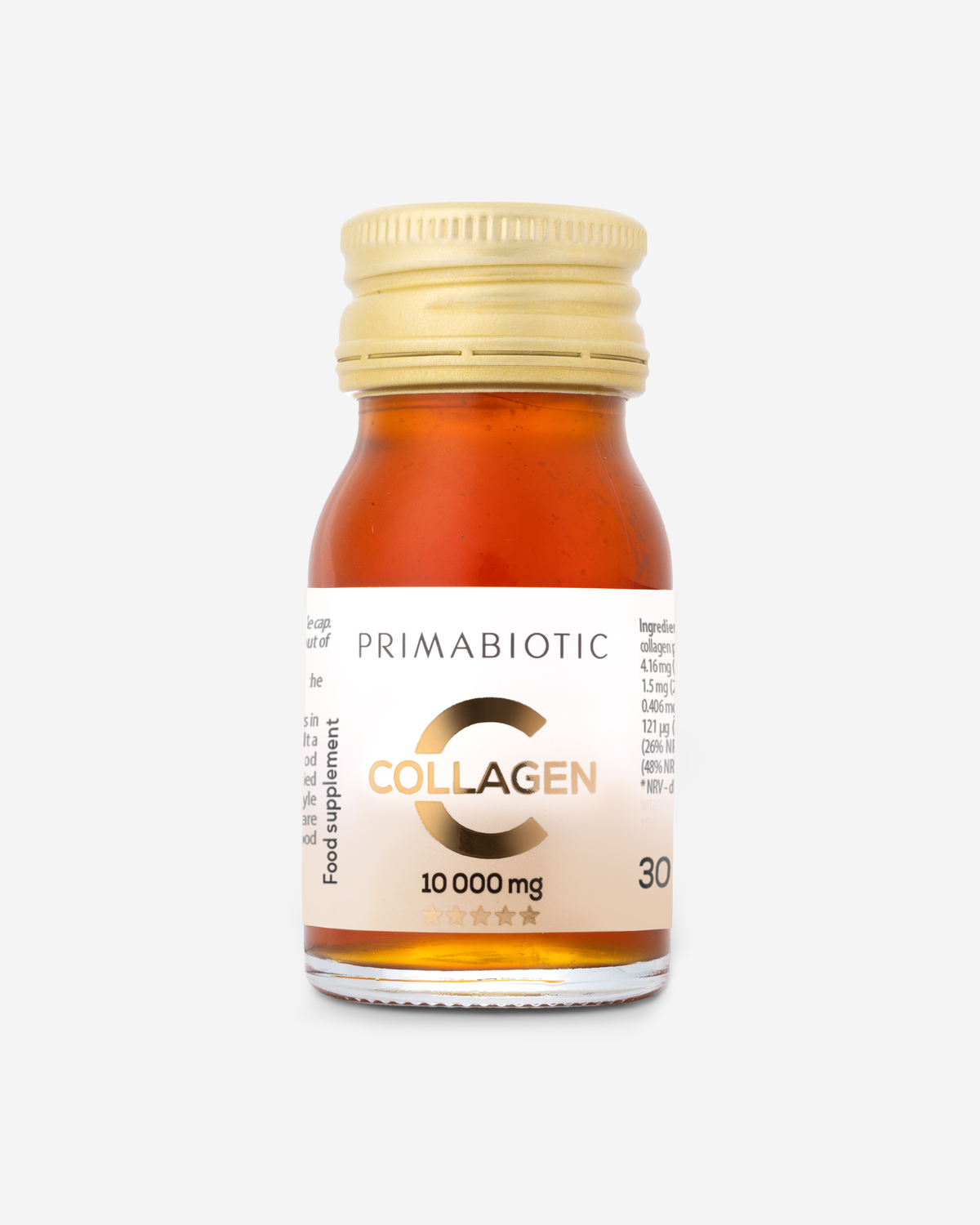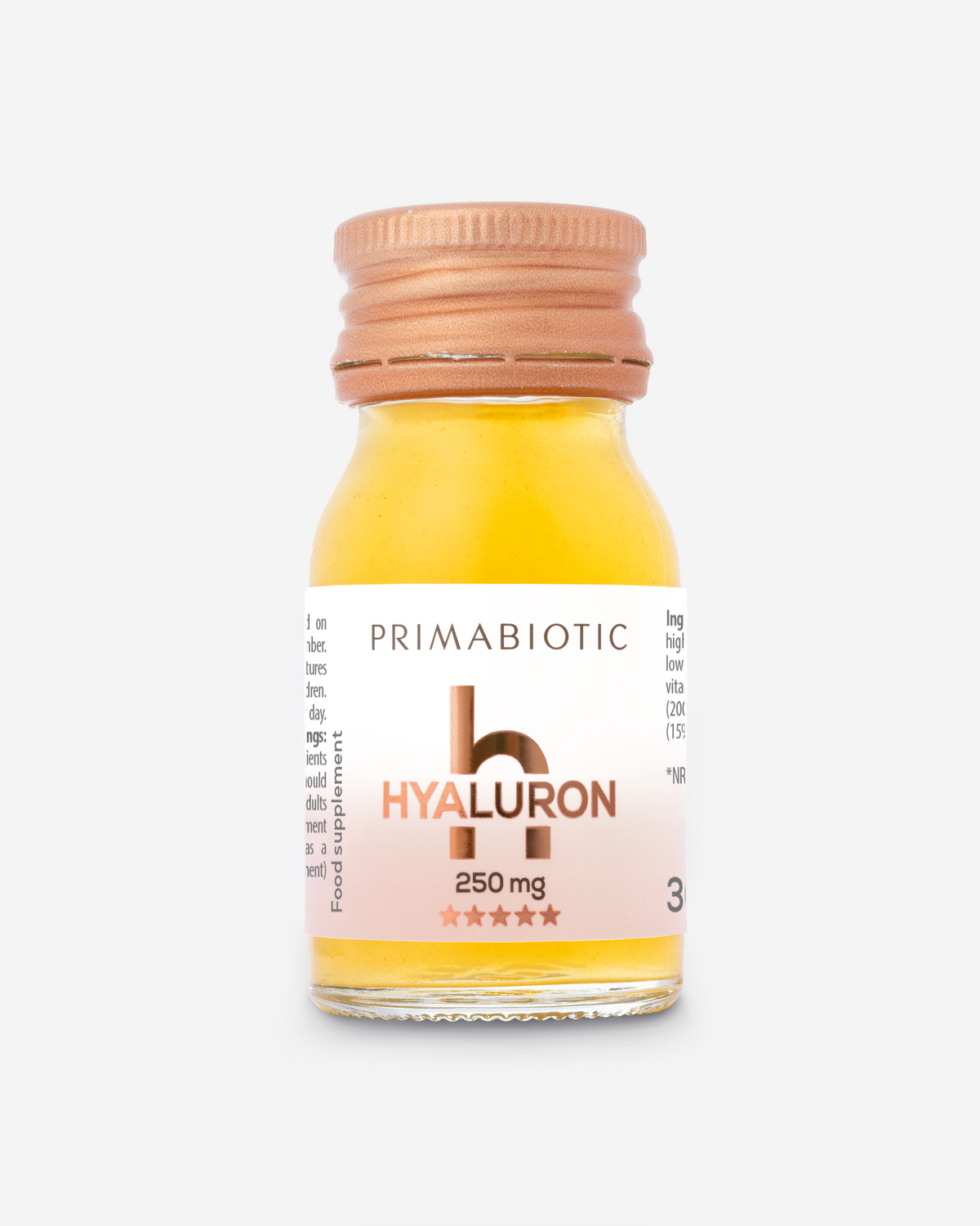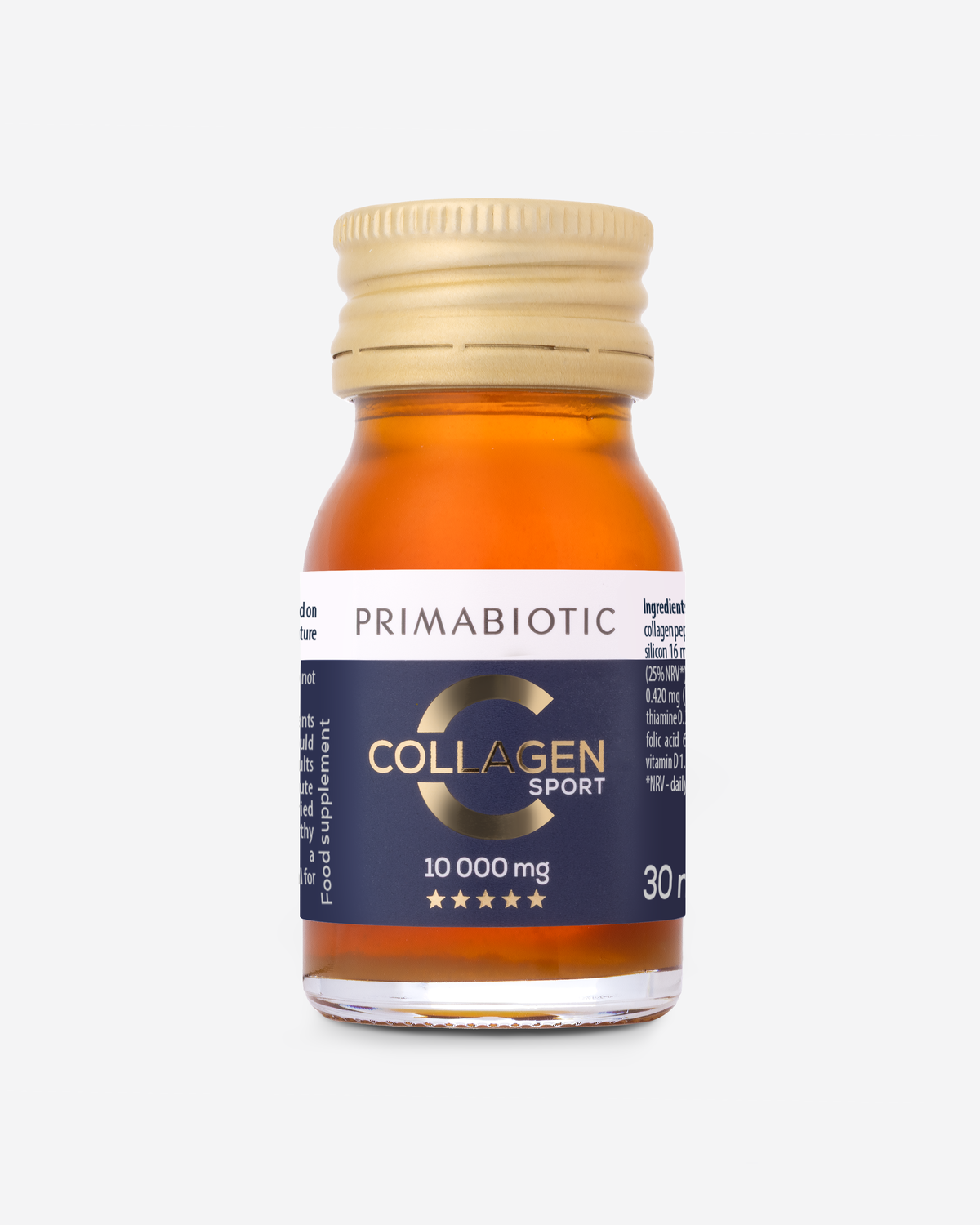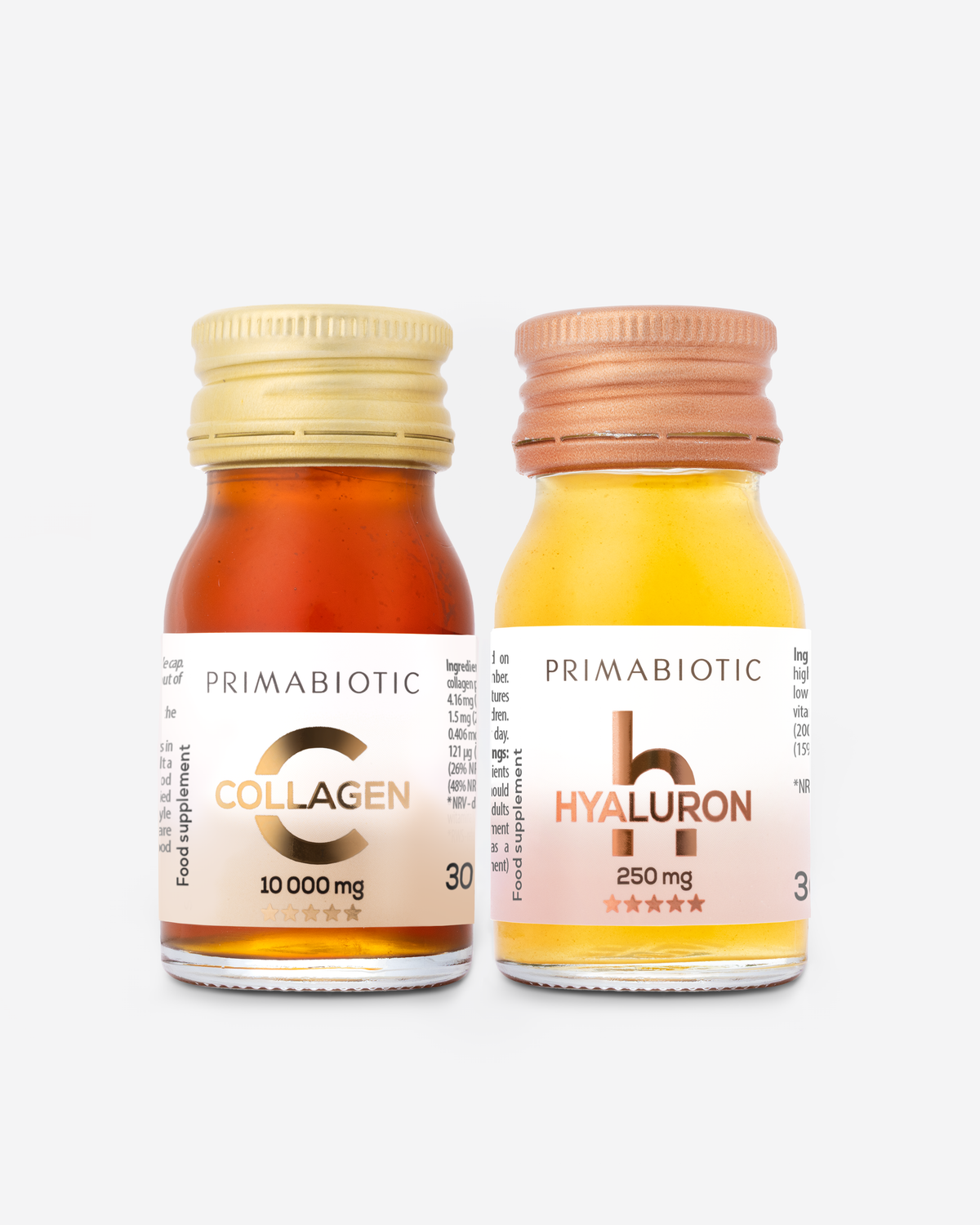Collagen supplementation is becoming more and more popular. It is an effective way of improving skin condition, increasing hydration and delaying skin ageing. In addition, by supplementing collagen, you contribute to preserving healthy joints. Do you know what the recommended daily dose of collagen is? Read below to find out more!
Collagen - why is it worth supplementing?
Collagen supplementation aims to: maintain normal elasticity, firmness and hydration of the skin, as well as providing an anti-ageing effect that reduces wrinkles. In addition, it influences the health of hair and nails, increases bone density and muscle mass, reduces pain associated with osteoarthritis and supports wound healing. We can obtain the above-mentioned benefits by taking the right dose of collagen throughout the day.
Collagen dosage - what does it depend on?
Age
As we age, we lose collagen. It starts between the ages of 18 and 29, after the age of 40 the decrease is - on average - 1% per year, and after the age of 80 collagen production decreases by 75% in relation to younger adults. Therefore, the daily dose of collagen depends on the age of the person who wants to start collagen supplementation. Younger people will need a lower daily dose of collagen than older people.
Lifestyle and weather conditions
A decrease in endogenous collagen synthesis is not only typical of old age. A decrease in this protein can occur in young people, due to genetics and hormones. In addition, this process is also influenced by stress, illness and too much physical exertion. These factors also play a role in choosing the recommended dose of collagen.
Factors that determine the recommended collagen dose also include temperature, ultraviolet radiation, alcohol consumption and smoking. You should remember that overexposure to the sun accelerates the breakdown of collagen fibres, so it is a good idea to always have a bottle of collagen with you when you are on holiday.
Diet
Collagen is a protein and its sources in the diet are animal products, especially skin, tendons and bones. Most collagen is found in pork, fish and fruit jellies, brawn, offal, cooked chicken feet and animal cartilage. Therefore, in people on a vegan or vegetarian diet, we may have a problem with a deficiency. For such people, the daily dose of collagen will be higher
A well-balanced diet rich in copper and vitamins A, C and E, which promote adequate collagen synthesis, also plays an important role in what daily dosage is. If we lack these vitamins in our diet, our body can have a problem to 'self-produce' collagen in the body, so a dose of collagen from dietary supplements will be required in higher amounts.
Recommended daily dose of collagen
The daily dose of collagen that is considered safe, based on the analysis of scientific studies, is in the range of 2.5-15 g. The recommended daily dose of collagen also depends on the type of supplement and the reason behind taking it.
Although collagen supplementation is safe, go for studied collagen products. Also, do not exceed the manufacturer's recommended daily dose of collagen.
Collagen - the dosage
Unfortunately, the daily diet does not provide an adequate dose of collagen to make up for its deficiencies in the body. In contrast, the systematic use of supplements with easily absorbable collagen helps to regenerate joint cartilage and improves the appearance of the skin, hair and nails.
The daily dose of collagen depends on, among other things, age, gender, health status, diet and the purpose for which we supplement it.
Collagen for the skin
There are several studies confirming the effectiveness of dietary collagen supplementation to improve skin condition. In one such study conducted by researchers in Japan, collagen peptides were administered to patients with ageing, wrinkled skin at a dose of 10 g.
Throughout the experiment, the researchers observed a statistically significant difference in skin hydration, accompanied by a significant increase in hydration in the collagen-taking group compared to the placebo group.
Considering the above data, it can be concluded that the daily dose of collagen to improve skin condition is approximately 10 g per day.
Collagen for joint cartilage
Collagen is responsible for the production of joint fluid and the condition of cartilage. It accelerates the regeneration of affected tissue and reduces the activity of enzymes responsible for causing inflammation and rheumatic pain. Collagen is also responsible for the tensile strength of cartilage and ensures its shape.
Studies have been carried out on young athletes with knee joint pain problems. It was shown that a collagen dose of 5 g of collagen peptides per day for 12 weeks led to a significant reduction in knee joint pain compared to the placebo group.
It can therefore be deduced that, in order to reduce joint pain, the daily dose of collagen should be a minimum of 5 g per day. Supplementation should last for approximately three months.
Is it possible to overdose on collagen?
Collagen supplementation is generally considered safe. No maximum daily doses of collagen have been established in past studies. The most commonly reported side effects include those on the gastrointestinal side, including: constipation, an unpleasant aftertaste in the mouth or a decrease in appetite.
Possible side effects to be aware of relate to hypersensitivity reactions to the allergens from which collagen is produced. Allergic reactions can occur when collagen from fish, shellfish or eggs is consumed. Their presence has been linked to the occurrence of a life-threatening anaphylactic reaction.
Collagen, what dose? Take collagen as recommended by the manufacturer and do not exceed the recommended daily dose of collagen. Taking collagen at the dose recommended by the manufacturer may help to achieve the best results. Seek professional advice if you experience any worrying symptoms.
Which collagen to choose?
A notable supplement that contains a high dose of collagen is Primabiotic Collagen. It is collagen of beef origin, so there is less risk of an allergic reaction when supplementing with it. It has a simple, natural composition, is free of added sugar and preservatives, and is assimilated at 95%.
In addition, there are additional vitamins in the collagen formula from Primabiotic, including the most important one, vitamin C, which is essential for proper collagen synthesis.
The daily dose of collagen in one bottle is as much as 10 g. Hydrolysed collagen is the best absorbed one and can exert a number of benefits on our body.
See also other articles:





